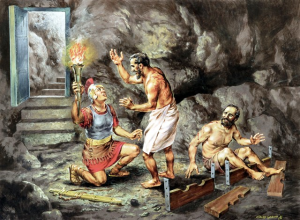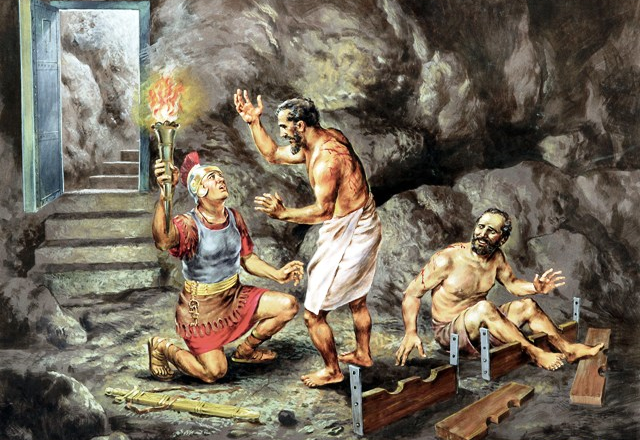From Acts 16-17
 Paul and Silas are put into prison. God sends an earthquake and all the prisoners are miraculously freed. Rather than try and escape Paul calls out to the jailer who was about to kill himself. The jailer runs in and asks, ‘What must I do to be saved?’ An opportunity for evangelism handed to him on a plate.
Paul and Silas are put into prison. God sends an earthquake and all the prisoners are miraculously freed. Rather than try and escape Paul calls out to the jailer who was about to kill himself. The jailer runs in and asks, ‘What must I do to be saved?’ An opportunity for evangelism handed to him on a plate.
This post is part of my bible in a year series.
Passage and Comments
Paul and Silas have travelled to Philippi. There they got involved in an incident with a demon which ended up with them being thrown in a dark prison (Acts 16.16-24). This is where we pick up.
25 About midnight Paul and Silas were praying and singing hymns to God, and the prisoners were listening to them, 26 and suddenly there was a great earthquake, so that the foundations of the prison were shaken. And immediately all the doors were opened, and everyone’s bonds were unfastened. (Acts 16.25-27)
‘Praying and singing hymns to God’. Paul and Silas are apparently unfazed by their imprisonment. Content with their circumstances and trusting in God they sing. The prisoners overhear.
Why do you think they are so at peace?
‘A great earthquake’, ‘All doors opened’, ‘Everyone’s bonds unfastened’. The earthquake is clearly from God. Everyone is freed. The LORD, it seems, wants them to escape like other occasions (Acts 5.17-21; 12.6-19).
27 When the jailer woke and saw that the prison doors were open, he drew his sword and was about to kill himself, supposing that the prisoners had escaped. (Acts 16.27)
‘About to kill himself’. The punishment for allowing prisoners to escape was death (Mt 28.14; Acts 12.19). The jailer wanted to end his own life because the punishment for would either be worse on him or even his whole family.
28 But Paul cried with a loud voice, “Do not harm yourself, for we are all here.” 29 And the jailer called for lights and rushed in, and trembling with fear he fell down before Paul and Silas. (Acts 16.28-29)
‘Do not harm yourself’. In the darkness, Paul somehow realises what the jailer is about to do and calls out for him to stop.
He displays compassion for an unlikely person. His jailer.
‘Trembling in fear’. We are not told why he is afraid. He was just about to kill himself and no doubt he sees evidence of a supernatural event. Everyone is free! He could be afraid of his punishment for allowing the prisoners to escape. He could be afraid because God has clearly done something here.
30 Then he brought them out and said, “Sirs, what must I do to be saved?” 31 And they said, “Believe in the Lord Jesus, and you will be saved, you and your household.” 32 And they spoke the word of the Lord to him and to all who were in his house. (Acts 16.30-32)
 ‘What must I do to be saved?’ From what? The immediate context suggests saved from a painful death. But he could have heard what Paul and Silas were saying about Jesus and salvation as well (e.g. Acts 16.17,25).
‘What must I do to be saved?’ From what? The immediate context suggests saved from a painful death. But he could have heard what Paul and Silas were saying about Jesus and salvation as well (e.g. Acts 16.17,25).
‘Believe in the Lord Jesus and you will be saved, you and your whole household’.
Such wonderful words for a man fearing for his life and those of his household.
 Many terms that the early Christians favored had a definite currency within imperial rhetoric—for example, eirēnē (peace), basileia (kingdom), eleutheria (freedom), dikaiosynē (righteousness), ekklēsia (assembly), parousia (coming or royal arrival). As part of this broader cultural climate, the Greek word pistis [faith, faithfulness, loyalty, allegiance] and its rough Latin equivalent, fides, had sociopolitical overtones of loyalty to the emperor (or other patrons) as well as reciprocity in receiving benefits in exchange for demonstrated loyalty. This patron-client, imperial context clearly informs Luke’s use of the pistis word group in his description of the conversion of the Philippian jailor. Luke is at pains to point out that Philippi is a Roman colony (Acts 16:12) and that both the magistrates and the jailor are initially in the thrall of the Roman imperial system (16:20–24). Thus when Paul and Silas respond to the jailor, saying, “Pisteuson upon the Lord Jesus, and you will be saved; you and your household” (16:31), we are justified in construing this as an exhortation for the jailor to transfer his ultimate allegiance from the emperor to the enthroned Jesus. (88, Bates, M., Salvation by Allegiance Alone)
Many terms that the early Christians favored had a definite currency within imperial rhetoric—for example, eirēnē (peace), basileia (kingdom), eleutheria (freedom), dikaiosynē (righteousness), ekklēsia (assembly), parousia (coming or royal arrival). As part of this broader cultural climate, the Greek word pistis [faith, faithfulness, loyalty, allegiance] and its rough Latin equivalent, fides, had sociopolitical overtones of loyalty to the emperor (or other patrons) as well as reciprocity in receiving benefits in exchange for demonstrated loyalty. This patron-client, imperial context clearly informs Luke’s use of the pistis word group in his description of the conversion of the Philippian jailor. Luke is at pains to point out that Philippi is a Roman colony (Acts 16:12) and that both the magistrates and the jailor are initially in the thrall of the Roman imperial system (16:20–24). Thus when Paul and Silas respond to the jailor, saying, “Pisteuson upon the Lord Jesus, and you will be saved; you and your household” (16:31), we are justified in construing this as an exhortation for the jailor to transfer his ultimate allegiance from the emperor to the enthroned Jesus. (88, Bates, M., Salvation by Allegiance Alone)
Probably his wife, children and slaves were in danger. He has to believe in the Lord Jesus. But he still does not know who the Lord Jesus is.
‘They spoke the word of the Lord to him’. The jailer brings his household into the jail to hear Paul and Silas share the good news of Jesus. Now they know the Lord Jesus.
33 And he took them the same hour of the night and washed their wounds; and he was baptized at once, he and all his family. 34 Then he brought them up into his house and set food before them. And he rejoiced along with his entire household that he had believed in God. (Acts 16.33-34)
‘Washed their wounds and he was baptised’. The jailer demonstrates sincere faith in God by caring for Paul and Silas and getting baptised along with his family.
How has your life changed since coming to believe in Jesus?
‘He had believed in God’. Paul told him to believe in Jesus. He believes in God. To believe in Jesus, God’s son, is to believe in God. His entire household rejoices. They all believe in God as well.
35 But when it was day, the magistrates sent the police, saying, “Let those men go.” 36 And the jailer reported these words to Paul, saying, “The magistrates have sent to let you go. Therefore come out now and go in peace.” (Acts 16.35-36)
The story doesn’t end here. But as we can see Paul left on good terms with the jailer.
About Mission
The jailer and his household came to faith in a way which shows God’s divine initiative in the earthquake and Paul’s compassion for one who could have been his enemy.
I believe the story reminds us that we need to take a dual perspective with regards to evangelism.
God is the one who divinely presented Paul with the opportunity. He is the one who caused the earth to rumble and the chains to be loosed. Paul took advantage of God’s leading to have compassion on the man and share the gospel with him and his family.
This dual perspective helps us avoid putting to much emphasis on our own plans and programming. God is involved in mission too. We need to look out for and seize the opportunities God presents before us.
Copyright © Joshua Washington and thescripturesays, 2016-17. All Rights Reserved.


